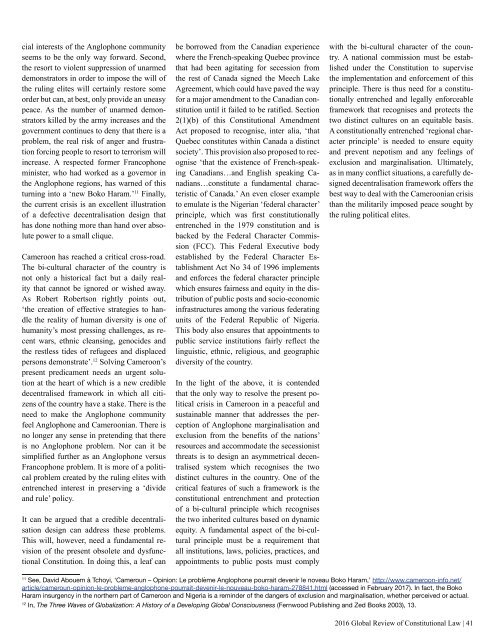2016 Global Review of Constitutional Law
I-CONnect–Clough Center collaboration.
I-CONnect–Clough Center collaboration.
You also want an ePaper? Increase the reach of your titles
YUMPU automatically turns print PDFs into web optimized ePapers that Google loves.
cial interests <strong>of</strong> the Anglophone community<br />
seems to be the only way forward. Second,<br />
the resort to violent suppression <strong>of</strong> unarmed<br />
demonstrators in order to impose the will <strong>of</strong><br />
the ruling elites will certainly restore some<br />
order but can, at best, only provide an uneasy<br />
peace. As the number <strong>of</strong> unarmed demonstrators<br />
killed by the army increases and the<br />
government continues to deny that there is a<br />
problem, the real risk <strong>of</strong> anger and frustration<br />
forcing people to resort to terrorism will<br />
increase. A respected former Francophone<br />
minister, who had worked as a governor in<br />
the Anglophone regions, has warned <strong>of</strong> this<br />
turning into a ‘new Boko Haram.’ 11 Finally,<br />
the current crisis is an excellent illustration<br />
<strong>of</strong> a defective decentralisation design that<br />
has done nothing more than hand over absolute<br />
power to a small clique.<br />
Cameroon has reached a critical cross-road.<br />
The bi-cultural character <strong>of</strong> the country is<br />
not only a historical fact but a daily reality<br />
that cannot be ignored or wished away.<br />
As Robert Robertson rightly points out,<br />
‘the creation <strong>of</strong> effective strategies to handle<br />
the reality <strong>of</strong> human diversity is one <strong>of</strong><br />
humanity’s most pressing challenges, as recent<br />
wars, ethnic cleansing, genocides and<br />
the restless tides <strong>of</strong> refugees and displaced<br />
persons demonstrate’. 12 Solving Cameroon’s<br />
present predicament needs an urgent solution<br />
at the heart <strong>of</strong> which is a new credible<br />
decentralised framework in which all citizens<br />
<strong>of</strong> the country have a stake. There is the<br />
need to make the Anglophone community<br />
feel Anglophone and Cameroonian. There is<br />
no longer any sense in pretending that there<br />
is no Anglophone problem. Nor can it be<br />
simplified further as an Anglophone versus<br />
Francophone problem. It is more <strong>of</strong> a political<br />
problem created by the ruling elites with<br />
entrenched interest in preserving a ‘divide<br />
and rule’ policy.<br />
It can be argued that a credible decentralisation<br />
design can address these problems.<br />
This will, however, need a fundamental revision<br />
<strong>of</strong> the present obsolete and dysfunctional<br />
Constitution. In doing this, a leaf can<br />
be borrowed from the Canadian experience<br />
where the French-speaking Quebec province<br />
that had been agitating for secession from<br />
the rest <strong>of</strong> Canada signed the Meech Lake<br />
Agreement, which could have paved the way<br />
for a major amendment to the Canadian constitution<br />
until it failed to be ratified. Section<br />
2(1)(b) <strong>of</strong> this <strong>Constitutional</strong> Amendment<br />
Act proposed to recognise, inter alia, ‘that<br />
Quebec constitutes within Canada a distinct<br />
society’. This provision also proposed to recognise<br />
‘that the existence <strong>of</strong> French-speaking<br />
Canadians…and English speaking Canadians…constitute<br />
a fundamental characteristic<br />
<strong>of</strong> Canada.’ An even closer example<br />
to emulate is the Nigerian ‘federal character’<br />
principle, which was first constitutionally<br />
entrenched in the 1979 constitution and is<br />
backed by the Federal Character Commission<br />
(FCC). This Federal Executive body<br />
established by the Federal Character Establishment<br />
Act No 34 <strong>of</strong> 1996 implements<br />
and enforces the federal character principle<br />
which ensures fairness and equity in the distribution<br />
<strong>of</strong> public posts and socio-economic<br />
infrastructures among the various federating<br />
units <strong>of</strong> the Federal Republic <strong>of</strong> Nigeria.<br />
This body also ensures that appointments to<br />
public service institutions fairly reflect the<br />
linguistic, ethnic, religious, and geographic<br />
diversity <strong>of</strong> the country.<br />
In the light <strong>of</strong> the above, it is contended<br />
that the only way to resolve the present political<br />
crisis in Cameroon in a peaceful and<br />
sustainable manner that addresses the perception<br />
<strong>of</strong> Anglophone marginalisation and<br />
exclusion from the benefits <strong>of</strong> the nations’<br />
resources and accommodate the secessionist<br />
threats is to design an asymmetrical decentralised<br />
system which recognises the two<br />
distinct cultures in the country. One <strong>of</strong> the<br />
critical features <strong>of</strong> such a framework is the<br />
constitutional entrenchment and protection<br />
<strong>of</strong> a bi-cultural principle which recognises<br />
the two inherited cultures based on dynamic<br />
equity. A fundamental aspect <strong>of</strong> the bi-cultural<br />
principle must be a requirement that<br />
all institutions, laws, policies, practices, and<br />
appointments to public posts must comply<br />
with the bi-cultural character <strong>of</strong> the country.<br />
A national commission must be established<br />
under the Constitution to supervise<br />
the implementation and enforcement <strong>of</strong> this<br />
principle. There is thus need for a constitutionally<br />
entrenched and legally enforceable<br />
framework that recognises and protects the<br />
two distinct cultures on an equitable basis.<br />
A constitutionally entrenched ‘regional character<br />
principle’ is needed to ensure equity<br />
and prevent nepotism and any feelings <strong>of</strong><br />
exclusion and marginalisation. Ultimately,<br />
as in many conflict situations, a carefully designed<br />
decentralisation framework <strong>of</strong>fers the<br />
best way to deal with the Cameroonian crisis<br />
than the militarily imposed peace sought by<br />
the ruling political elites.<br />
11<br />
See, David Abouem à Tchoyi, ‘Cameroun – Opinion: Le problème Anglophone pourrait devenir le noveau Boko Haram,’ http://www.cameroon-info.net/<br />
article/cameroun-opinion-le-probleme-anglophone-pourrait-devenir-le-nouveau-boko-haram-278841.html (accessed in February 2017). In fact, the Boko<br />
Haram insurgency in the northern part <strong>of</strong> Cameroon and Nigeria is a reminder <strong>of</strong> the dangers <strong>of</strong> exclusion and marginalisation, whether perceived or actual.<br />
12<br />
In, The Three Waves <strong>of</strong> <strong>Global</strong>ization: A History <strong>of</strong> a Developing <strong>Global</strong> Consciousness (Fernwood Publishing and Zed Books 2003), 13.<br />
<strong>2016</strong> <strong>Global</strong> <strong>Review</strong> <strong>of</strong> <strong>Constitutional</strong> <strong>Law</strong> | 41


